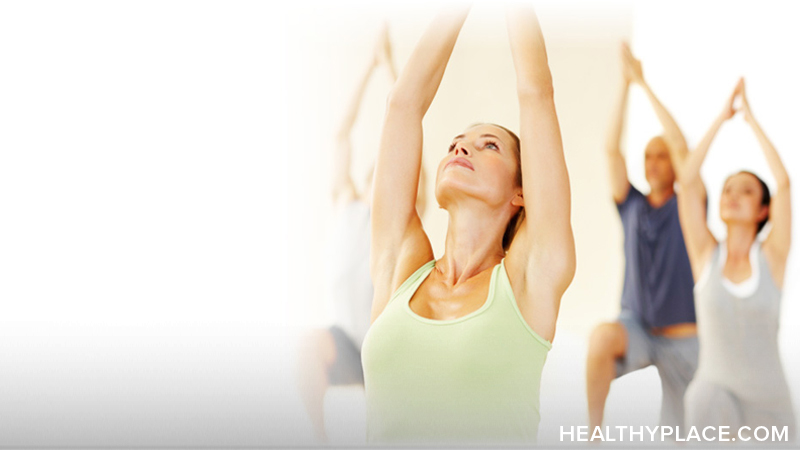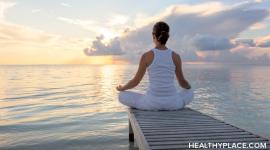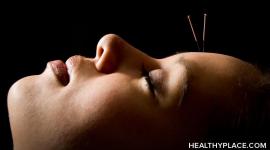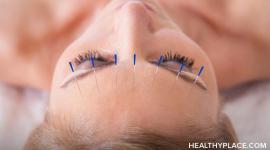Treating Anxiety Disorders Without Medication

There are many effective treatments for anxiety disorders including CBT, breathing control techniques, relaxation therapy, herbal treatments and exercise.
Contents:
- Cognitive behavior therapy (CBT)
- Breathing control techniques
- Relaxation therapy
- Exercise
- Caffeine reduction
- Complementary therapies
- Medication
Education and information about anxiety disorders are very important first steps in the treatment process. If people understand anxiety is an exaggeration of a normal response as well as why they experience particular symptoms (ie. tingling fingers occur because the body has moved blood to major muscle groups) this assists in breaking down some of the fear associated with having an anxiety disorder.
There are a number of treatment options available for anxiety disorders, including cognitive behavior therapy, breathing control techniques, relaxation therapy, exercise, caffeine reduction, complementary therapies and medications.
Cognitive behavior therapy (CBT)
CBT is based on the notion that people develop negative, self defeating patterns of thought which results in emotional distress (such as anxiety or depression) and maladaptive or unhealthy learned behavior. These thought and behavior patterns can be unlearned. CBT is conducted by a therapist (counselor, psychologist, psychiatrist) and usually consists of a series of sessions taking place over a number of weeks. Studies have found that CBT is at least as effective as medication in treating anxiety disorders and has the advantage of costing less over time and producing longer lasting benefits. There is, however, no clear evidence that combining medications with CBT enhances the treatment for anxiety disorders (13). The therapy typically produces benefits after a few weeks, depending on the frequency of visits to the therapist and the frequency of home practice. A disadvantage of CBT is that it requires a certain level of commitment, in both time and energy/motivation from a person. Also, it is not available in all areas of Australia.
CBT for anxiety disorders involves teaching people to examine the thought patterns that produce their anxiety (14). Underlying most types of anxiety is the tendency to overestimate both the likelihood of a feared consequence and how bad it would really be if the feared consequence actually eventuated. People are encouraged to practice realistic thinking in order to evaluate the real level of threat or risk which is anxiety-causing. They learn to use evidence to challenge unhelpful or unrealistic thoughts and fears. For instance, if a person with panic disorder feels they are going to die when having a panic attack they are asked to explore the chances of this actually occurring. Did they die last time they had a panic attack? The results of any medical investigations of their anxiety symptoms can be used here as evidence (ie. have any tests shown you have heart disease or other physical conditions?).
Other techniques used in CBT include controlled breathing techniques and graded exposure. Graded exposure involves getting people to gradually confront situations which produce anxiety symptoms. For it to be successful, people have to remain in the situation until their anxiety has subsided and they must confront the feared situation repeatedly and frequently. People with OCD are provided with techniques to help them resist performing compulsive behaviors.
Breathing control techniques
Many people hyperventilate when anxious, and this can add to feelings of anxiety and symptoms of dizziness and tingling. A controlled rate of breathing, aiming for a rate of 8-12 breaths per minute breathing in a smooth, light way is very effective at reducing symptoms of panic and acute anxiety. Smooth, light breathing is preferred to deep breathing which can accentuate feelings of anxiety and light-headedness. Breathing control techniques should be practiced several times a day when not particularly anxious in order to make it habitual. This makes it more likely that an individual will be able to implement the technique even when highly anxious and perhaps not thinking clearly.
Relaxation therapy
Relaxation therapy involves several techniques designed to help people achieve a relaxed state such as breathing techniques, progressive muscle relaxation and meditation. Progressive muscle relaxation involves tensing and then relaxing the muscles in the body, one major muscle group at a time. Over time, relaxation results in a measurable reduction in the basic level of anxiety or tension which an individual experiences.
Exercise
Exercise is an important part of a treatment program for anxiety disorders. When we exercise our body releases endorphins, chemicals that make us feel happier and calmer, resulting in a general sense of well being. For people who are limiting their activities due to an anxiety disorder, exercise can provide an opportunity to get out and confront their fears.
Caffeine reduction
People with anxiety disorders will benefit from cutting down their intake of caffeine. Caffeine is a stimulant and increases the amount of the hormone adrenaline in the body. Too much caffeine, therefore, can cause symptoms associated with anxiety. Caffeine is found in coffee, tea, chocolate and some soft drinks (especially many of the so-called 'energy' drinks).
Complementary therapies
People with an anxiety disorder may find some complementary therapies to be beneficial. Massage therapy, aromatherapy, meditation and yoga have all been used in the treatment of anxiety. Herbal treatments include St. John's wort, passionflower, valerian and kava. However, more studies into the efficacy and safety of complementary treatments for anxiety disorders are still required. Kava, for example, has been the subject of a warning by the Therapeutic Goods Administration following international reports linking products containing the substance with liver damage.
It is important that people using complementary therapies together with conventional treatments inform their doctor about the type of therapy they are receiving. This is particularly important when taking a herbal remedy as they can have their own side effects (eg. St. John's wort causes photosensitivity) or interact with conventional treatments such as anti-depressants. Complementary therapies do not treat the underlying cause of anxiety.
Anti-anxiety Medication
Like complementary therapies, prescription medications only relieve symptoms associated with an anxiety disorder and do not address the underlying issues which cause the anxiety. Therefore, medication does not provide a long term solution to anxiety disorders. The medications most commonly prescribed for anxiety disorders are selective serotonin re-uptake inhibitors (SSRIs), a form of anti-depressant. These medications typically take several weeks to start working and symptoms often return after medication is discontinued. These medications should never be discontinued abruptly. It is common for the medications to cause some degree of nausea, headache and even a slight increase in symptoms of nervousness initially. These symptoms usually subside after a week or so. Other side effects include insomnia, dry mouth and delayed ejaculation. Drowsiness is less common. People sometimes have to try several SSRIs before they find one that is suitable for them. If SSRIs do not prove effective there are many other types of antidepressants that may be of benefit.
Benzodiazepines, (tranquilisers) were previously used to treat anxiety disorders. While these medications work quickly they have a sedative effect and there is a high risk that people will become dependent on them. The effect also tends to wear off quite quickly as the person becomes tolerant to the effects. Therefore, antidepressant drugs are now the preferred option as they do not result in dependence or tolerance. However, benzodiazepines may be suitable for some people with severe symptoms, for short periods.
Betablockers are sometimes prescribed for performance anxiety (eg. public speaking) as they reduce heart rate and tremor. They are more often used for control of high blood pressure and hence side effects include low blood pressure. They should not be used by individuals with asthma. Betablockers have not been shown to be more effective than a placebo when used for more generalised types of anxiety.
back to: Alternative Medicine Home ~ Alternative Medicine Treatments
APA Reference
Staff, H.
(2008, October 24). Treating Anxiety Disorders Without Medication, HealthyPlace. Retrieved
on 2025, November 17 from https://www.healthyplace.com/alternative-mental-health/treatments/treating-anxiety-disorders-without-medication



